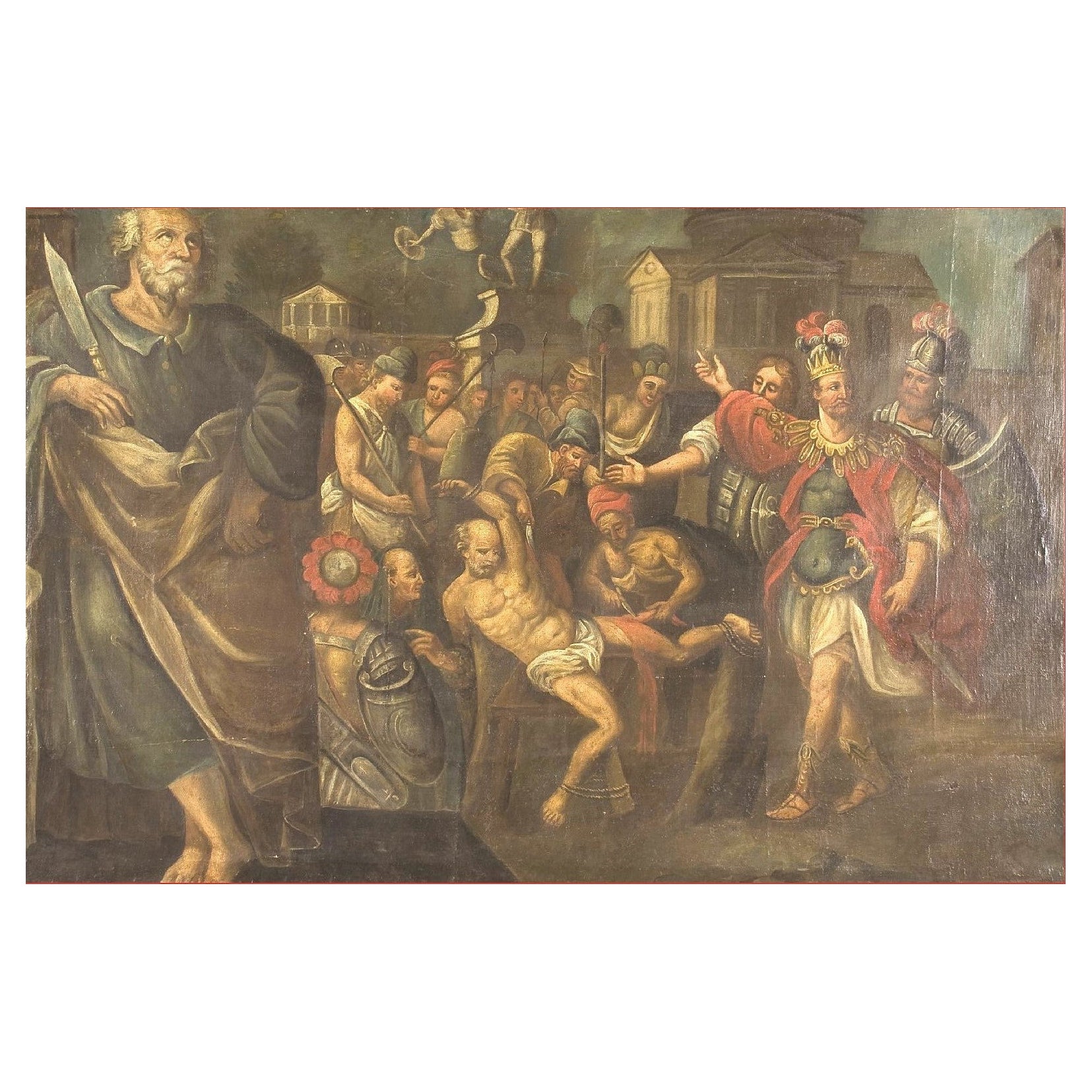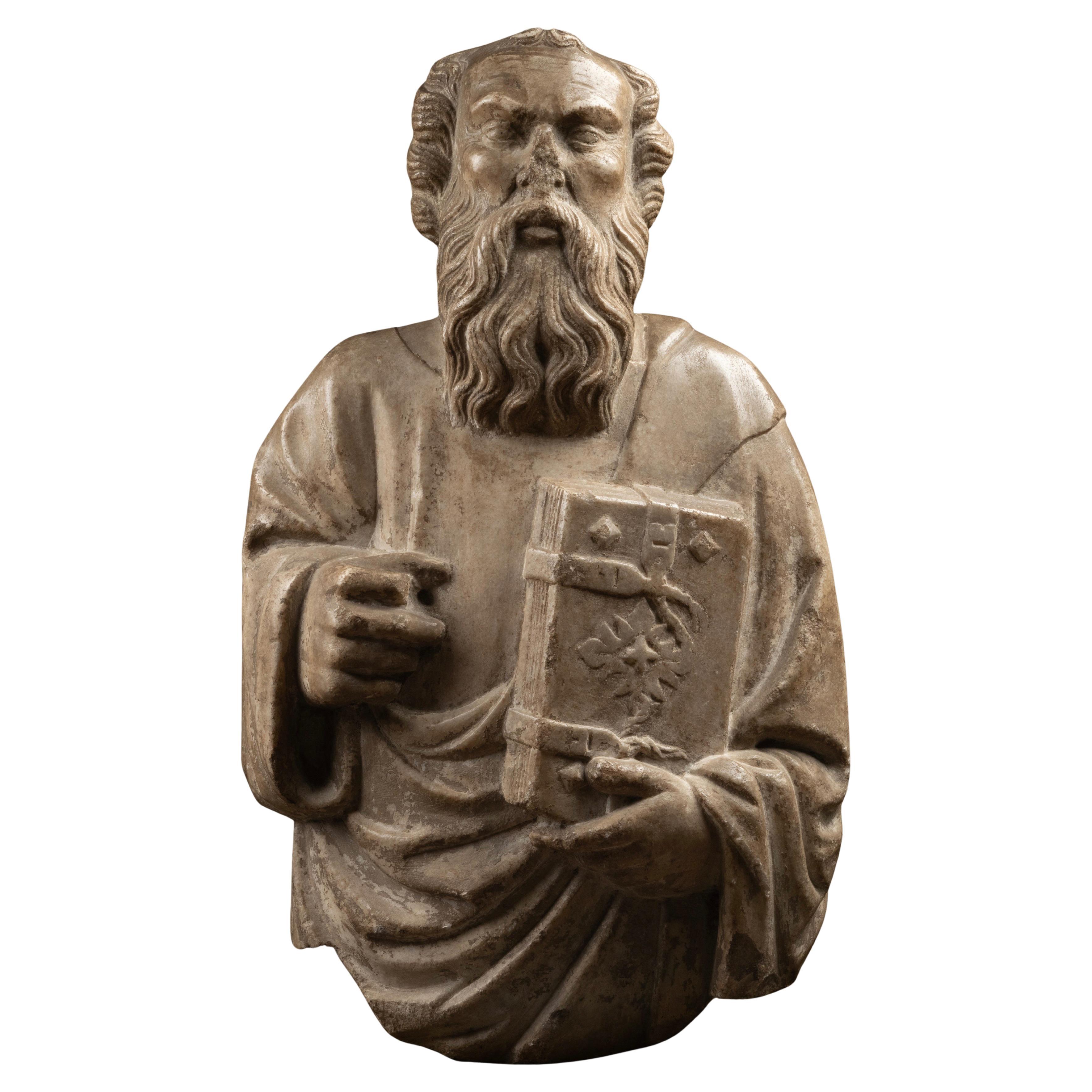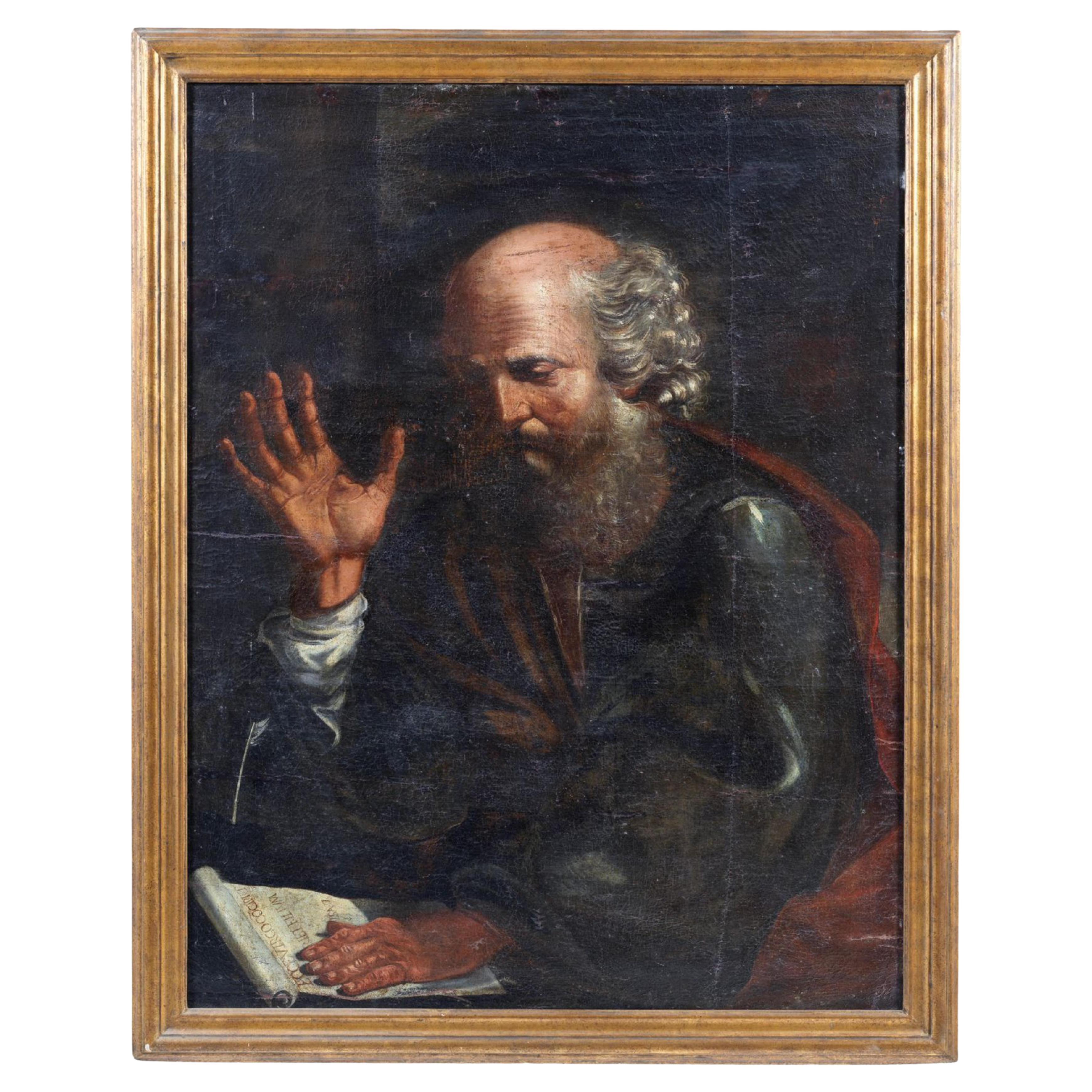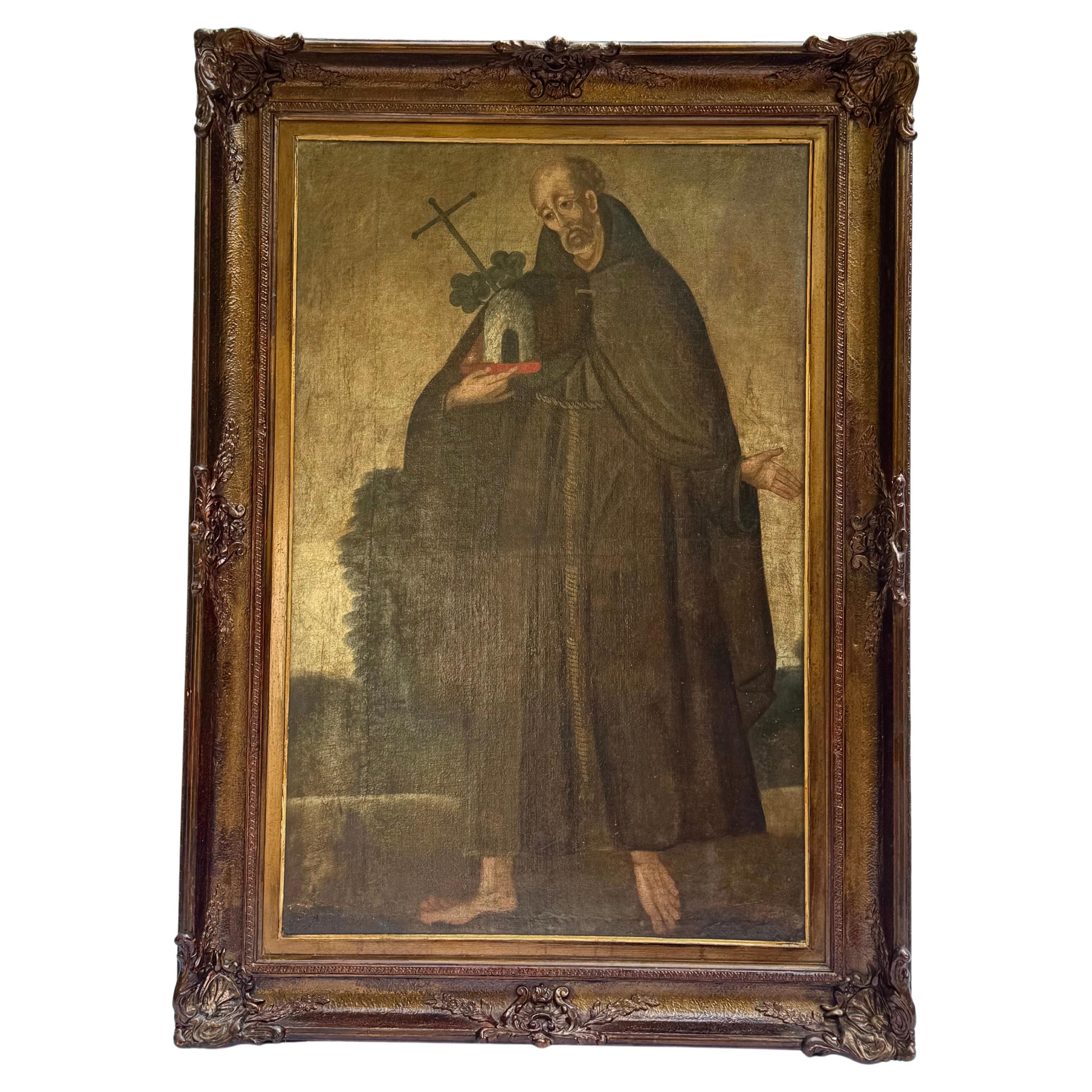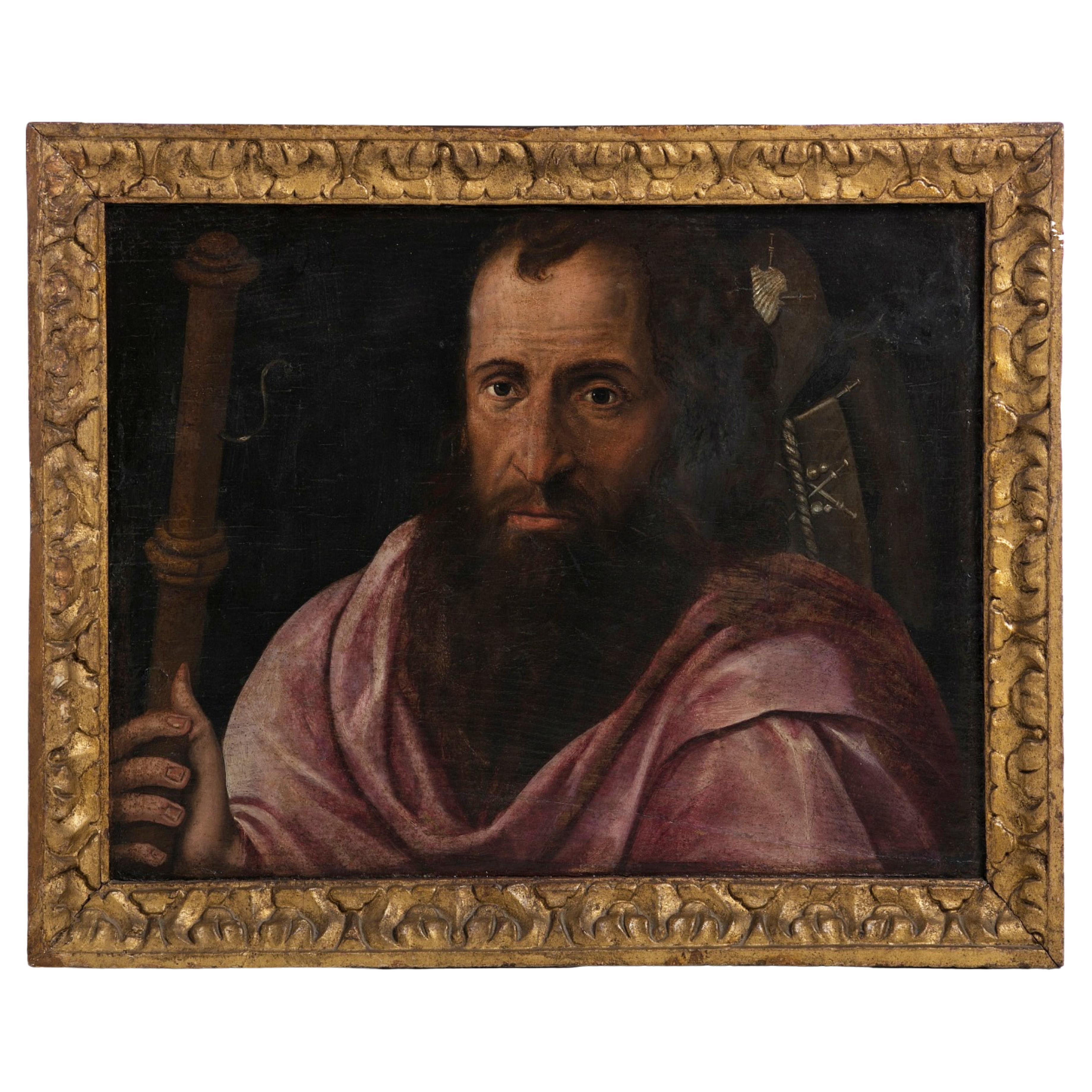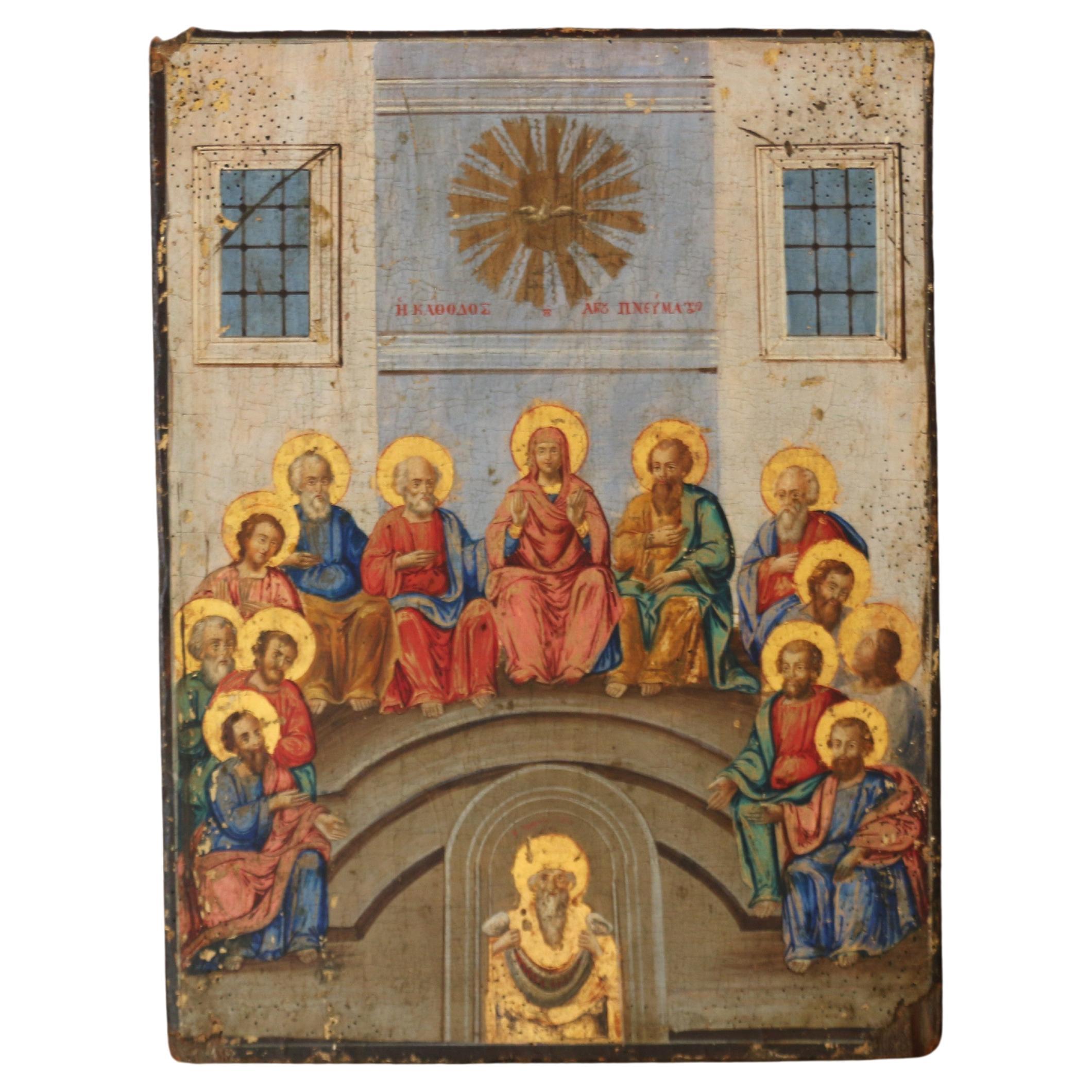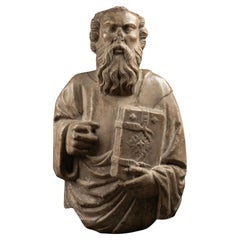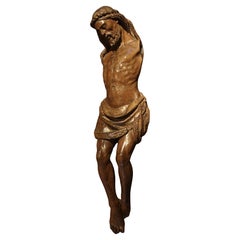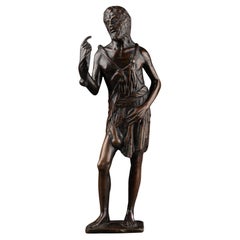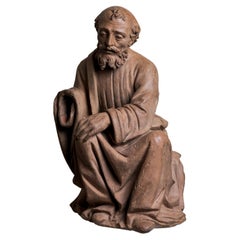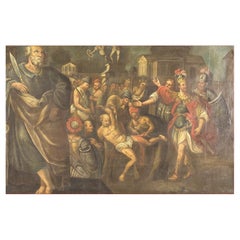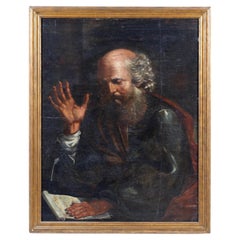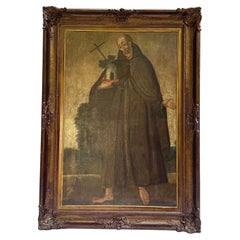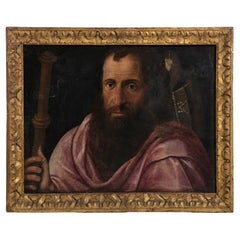Items Similar to Circle of Pietro Cavallini - St. Bartholomew - 14th century Fresco
Want more images or videos?
Request additional images or videos from the seller
1 of 6
Circle of Pietro Cavallini - St. Bartholomew - 14th century Fresco
$160,558.56
£120,215.17
€135,000
CA$224,555.44
A$244,745.36
CHF 127,452.35
MX$2,953,033.37
NOK 1,602,127.35
SEK 1,504,024.94
DKK 1,028,444.22
About the Item
Circle of Pietro Cavallini (Rome, 1250–1330)
St. Bartholomew
Fresco transferred onto canvas
Umbria, 14th century
66.5 x 40 cm
Provenance:
Collection of Raymond Van Marle (The Hague, 1887 – Perugia, 1936), Solomeo (Perugia, Italy)
Bibliography:
Federico Zeri Foundation - University of Bologna; Federico Zeri Photo Archive No. 10429
Alinari - Brogi Archive: BGA-F-025726-0000
Photographer: Brogi, 1936, Corciano, Solomeo, private collection of Raymond Van Marle
St. Bartholomew, one of the twelve apostles of Jesus, is depicted here holding a book and a knife, symbolizing his martyrdom by flaying. According to the Golden Legend, the saint’s appearance is described as follows: “His hair is black and crisped, his skin fair, his eyes wide, his nose even and straight, his beard thick with a few grey hairs; he is of medium stature.”
This fresco captures delicate realism in the saint’s facial wrinkles, hair, and drapery, evoking the nascent whispers of Renaissance artistry. The Byzantine linear treatment of the drapery is minimized, replaced by rounded modeling, while the traditional linear definition of facial features is completely abandoned. The work demonstrates unprecedented spatial clarity and a sculptural approach, with a directional use of light that molds and reveals the figure rather than simply decorating it.
The artist’s ambition to overcome the flatness characteristic of 13th-century Italian painting is evident in the volumetric plasticity of the forms. Pietro Cavallini’s style integrates classical Roman elements with the Byzantine artistic tradition, alongside northern Gothic influences, creating a vivid and naturalistic approach to painting.
Attribution:
The fresco was first attributed to Pietro Cavallini by Raymond Van Marle, who published a monograph on the painter in 1921. This hypothesis was later corroborated by Federico Zeri, a prominent Italian art historian, who cataloged the work in his photothèque archives at the University of Bologna. Zeri attributed it to an Umbrian artist influenced by Cavallini, working alongside him.
This attribution aligns with broader discussions about the frescoes in Assisi, which Bruno Zanardi ascribed to Pietro Cavallini and his circle. While Giorgio Vasari credited the Assisi frescoes to Giotto, claiming he single-handedly initiated the Renaissance, Zanardi and Zeri suggest that Cavallini collaborated with local Umbrian artists, profoundly influencing the region's artistic production.
Zanardi’s detailed analysis of techniques and materials used in the Assisi frescoes supports this conclusion. Unlike traditional art history, which relies on stylistic assessment, Zanardi’s methodology examined chemical compositions, workshop practices, and brushstroke techniques, reinforcing Cavallini’s influence on the project.
Historical Context:
For much of the 20th century, no paintings by Cavallini were thought to survive, and his work was known primarily through Vasari’s Lives, which mistakenly identified him as Giotto’s disciple. Panofsky later suggested that Cavallini, as much as Cimabue, could claim to be Giotto’s master, given his transformative Roman experience.
Cavallini’s most famous works, such as the frescoes in Santa Cecilia in Trastevere, Rome (circa 1290), reveal his classicizing tendencies and mastery of soft color harmonies and shading. These frescoes, particularly the seated apostles, exemplify his ability to define space with solid, three-dimensional forms. Later, in Naples, Cavallini absorbed Gothic influences under the patronage of Charles of Anjou.
Although many of Cavallini’s Roman works are lost, his legacy survives through his students and their contributions to medieval Italian painting. The rediscovery of Cavallini’s Santa Cecilia frescoes marked a turning point, leading scholars to recognize his pivotal role in the artistic revival of Rome preceding Giotto. His majestic figures, imbued with weight and volume, bridged the Byzantine tradition and the naturalistic Renaissance style.
Margaret Field aptly summarized Cavallini’s influence, stating, “Cavallini was to the Roman school what Giotto was to the Florentine and Duccio to the Sienese.”
Provenance and Historical Significance:
This fresco comes from the prestigious collection of Raymond Van Marle, an art historian and connoisseur who lived in Perugia. Van Marle, a prolific writer and researcher, authored the seminal Development of the Italian Schools of Painting (21 volumes) and several studies on iconography. His collection, including this fresco, was documented in the Alinari-Brogi archive in 1936.
Van Marle’s contributions to art history were groundbreaking. He emphasized the importance of combining archival research with connoisseurship and frequently made new discoveries and attributions. His encyclopedic knowledge and humanist approach earned him comparisons to Erasmus of Rotterdam.
This fresco, with its documented provenance and historical significance, represents a vital link in the evolution of Italian medieval and early Renaissance art, bridging the styles of Pietro Cavallini and his contemporaries.
- Dimensions:Height: 26.19 in (66.5 cm)Width: 15.75 in (40 cm)Depth: 0.79 in (2 cm)
- Style:Medieval (Of the Period)
- Materials and Techniques:
- Place of Origin:
- Period:
- Date of Manufacture:14th century
- Condition:Replacements made: Fresco transferred onto canvas. Wear consistent with age and use.
- Seller Location:Bruxelles, BE
- Reference Number:1stDibs: LU6666242566032
About the Seller
5.0
Vetted Professional Seller
Every seller passes strict standards for authenticity and reliability
1stDibs seller since 2022
15 sales on 1stDibs
Typical response time: <1 hour
- ShippingRetrieving quote...Shipping from: Bruxelles, Belgium
- Return Policy
Authenticity Guarantee
In the unlikely event there’s an issue with an item’s authenticity, contact us within 1 year for a full refund. DetailsMoney-Back Guarantee
If your item is not as described, is damaged in transit, or does not arrive, contact us within 7 days for a full refund. Details24-Hour Cancellation
You have a 24-hour grace period in which to reconsider your purchase, with no questions asked.Vetted Professional Sellers
Our world-class sellers must adhere to strict standards for service and quality, maintaining the integrity of our listings.Price-Match Guarantee
If you find that a seller listed the same item for a lower price elsewhere, we’ll match it.Trusted Global Delivery
Our best-in-class carrier network provides specialized shipping options worldwide, including custom delivery.More From This Seller
View AllCircle of Pierpaolo and Jacobello Dalle Masegne (Venice, late 14th century)
Located in Bruxelles, BE
Circle of Pierpaolo and Jacobello Dalle Masegne (Venice, late 14th century)
San Bartolomeo
high relief 'en applique'
white marble
52 x 30 x 14 cm
Provenance :
Collection South of...
Category
Antique 15th Century and Earlier Italian Gothic Figurative Sculptures
Materials
Marble
Christ - Umbria, second half of the 15th century
Located in Bruxelles, BE
Christ
Umbria, Orvieto?
Second half of the 15th century
77 x 16.5 cm
Category
Antique 15th Century and Earlier Italian Renaissance Figurative Sculptures
Materials
Walnut
$7,581 Sale Price
25% Off
Saint John the Baptist
- After a model by Bertoldo di Giovanni
Located in Bruxelles, BE
Saint John the Baptist
Bronze
After a model by Bertoldo di Giovanni (ca. 1440–1491)
Northern Italy, 18th century
27,5 x 8 x 5 cm
This finely cast and patinated bronze statuette ...
Category
Antique Late 18th Century Italian Renaissance Figurative Sculptures
Materials
Bronze
Fra Mattia Della Robbia, Saint Joseph, Tuscany, Around 1505-1510
By Della Robbia
Located in Bruxelles, BE
Fra Mattia Della Robbia (Firenze 1468-1534)
Saint Joseph
Terracotta
Tuscany, around 1505-1510
55 x 40 x 30 cm
Marco della Robbia the Younger (April 6, 1468 in Florence - 15...
Category
Antique 16th Century Italian Renaissance Figurative Sculptures
Materials
Terracotta
Bolognese School of the 16th Century - Mummy of Saint Catherine of Bologna
Located in Bruxelles, BE
Bolognese School of the 16th Century
Mummy of Saint Catherine of Bologna
Oil on Panel
20,5 x 7 x 0,8 cm
This rare painting depicts Saint Catherine of Bologna as a mummy, housed in a ...
Category
Antique 16th Century Italian Renaissance Paintings
Materials
Wood, Giltwood
$3,320 Sale Price
20% Off
Free Shipping
Cercle of Romano Alberti, Page, Around 1530-1540
Located in Bruxelles, BE
Cercle of Romano Alberti, dit Il Nero da Sansepolcro ( San Sepolcro, 1521-1568 )
Page
Mixed media : wood core, papier mâché, stucco, polychrome and gilded
Italy, around 1530-154...
Category
Antique 16th Century Italian Renaissance Figurative Sculptures
Materials
Stucco, Wood, Paper
$12,368 Sale Price
35% Off
You May Also Like
Antique painting Martyrdom of St. Bartholomew from the 17th century
Located in Cesena, FC
Antique painting Martyrdom of St. Bartholomew, by northern European painter of the 17th century
Oil on canvas 100 x 150 cm
Painting based on a subject by Martin de Vos (1532-1603) a...
Category
Antique 17th Century Belgian Paintings
Materials
Canvas
17th-Century Italian School "Saint Matthew."
By Midcentury Italian school
Located in Madrid, ES
17th-Century Italian School
"Saint Matthew."
Oil on canvas.
109.50 x 85 cm.
Frame present
Good condition
Category
Antique 17th Century Italian Baroque Paintings
Materials
Paint
RARE Italian 17th Century Oil on Canvas of Saint Matthew of Agrigento
Located in Rio De Janeiro, BR
Italian 17th Century Oil on Canvas of Saint Matthew of Agrigento
This striking oil on canvas, executed in Italy in the 17th century, depicts San Matteo di Agrigento (St. Matthew of A...
Category
Antique 17th Century Italian Renaissance Paintings
Materials
Canvas
Italian School "Apostle" 17th Century
Located in Madrid, ES
Italian School
"Apostle" 17th Century
Oil on oak wood
Carved and gilded wooden frame.
Small defects.
Dim.: 44 x 58 cm
good conditions
Category
Antique 17th Century Italian Baroque Paintings
Materials
Paint
Antique Painting Descent of the Holy Spirit Upon the Apostles
Located in North Hollywood, CA
Introducing this wonderful antique wall painting on wood with gold leaf accents. This icon depicts the Pentecost, also known as the Descent of the Holy Spirit upon the Apostles. The ...
Category
Antique 19th Century Unknown Medieval Paintings
Materials
Gold Leaf
18th Century Eastern Orthodox Tempera Icon
Located in Dekalb, IL
Antique tempera Icon depicting St. John the Baptist holding his own head, a reference to his execution by beheading. This came as a result of John publicl...
Category
Antique 17th Century Greek Renaissance Paintings
Materials
Tin
More Ways To Browse
Perugia Italy
Bureau Vintage 1950
Capodimonte Style
Ceramic Fish Dish
Chinese Sculpture Carved Wall Panels
Christ Of Saint John Of The Cross
Cloud Dining Table
Dining Tables With Lions
English Hunting Scene
Erotic Silver
Fives Lille Majolica
Footed Silver Vase
Freight Elevator
French Green Pot
Gilt Bronze Miniatures
Goat Feet
Gold Crane Japanese
Greek Key Art Deco
